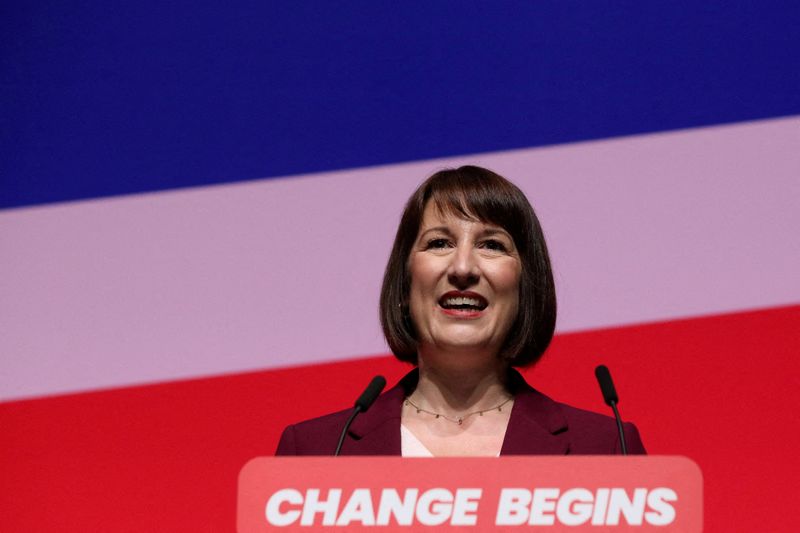By William Schomberg
LONDON (Reuters) - Speculation is swirling about what new British finance minister Rachel Reeves might announce in her first tax and spending plan this month, but one thing she seems certain to say is that she is doing it for the "working people."
The term "working people" has been used repeatedly by Reeves and Prime Minister Keir Starmer before the Oct. 30 budget as part of their efforts to reassure most voters that they won't be hit by the tax increases that seem to be on the way.
Starmer referred to "working people" 16 times in a speech to the annual conference of the Labour Party last month, without providing a definition of exactly who working people are.
Similarly vague references have been part of the British political discourse going back years.
Former Labour Prime Minister Tony Blair and his finance minister Gordon Brown referred regularly to "hard-working families" to disassociate the party with welfare handouts.
In 2015, when the party tried - and failed - to return to power, Reeves defined Labour as the party of "working people" and stressed that "we are not the party of people on benefits."
Alan Finlayson, a professor of political and social theory at the University of East Anglia, said politicians in general were aware they no longer resembled the people they aim to represent and Labour was no longer able to call itself the party of the working class which sounded outdated.
"How do you speak to everybody when actually no one knows who on earth you are for, and how do you seem like you're not for too narrow an interest?" Finlayson said.
"You say 'working people', 'hard-working families', etc. It's probably vague enough that you won't get into trouble but it's probably too vague to energise anybody."
In the mid-2010s, the heroes of British political rhetoric were the JAMS - the "just about managing" households championed by Conservative leader Theresa May when she was prime minister.
The Resolution Foundation, a think tank, stepped in to help provide guidance on who the JAMs might be, pointing to six million working-age households on low to middle income.
The current focus on "working people" by Starmer and Reeves seems be an attempt to reassure most voters that the burden of the tax increases coming in the budget will fall on the wealthy.
Labour promised before the election not to increase income tax, value-added tax and social security contributions, which together account for the lion's share of tax revenues, leaving the new government with a challenge to raise the money it needs to improve public services and invest in infrastructure.
This week Reeves and Starmer declined to rule out an increase in social security contributions paid by employers.
The Conservatives accused them of breaking their election pledges. Labour said it had been clear it would be "working people" who would be spared tax increases, not companies.

Finlayson said the linguistic emphasis of the new government showed where its priorities lie.
"That fits in with the Labour tradition, where Gordon Brown came from, where working has a moral dignity and is a backbone of the country," he said.